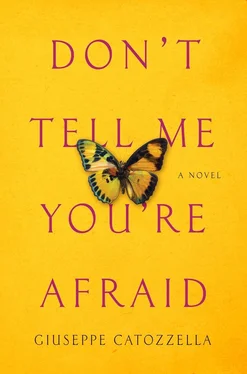In fact, as I worked, all I thought about was when I would start running again.
Then the truth came out.
I could not use the track until documents arrived from Somalia confirming the fact that I was an Olympic Committee athlete in political asylum in another country.
Six weeks had already gone by. A month and a half without running. I tried to make Eshetu understand that it was suicide, that I should run regardless, because those documents could take months, if not years, to come and in the meantime I was in danger of forgetting what a tartan track was like. I tried to make him see that things in Somalia were worse than he imagined. That it might be years before those documents arrived. I tried in every way I could to persuade him to let me train with his other athletes. But there was no way.
“You cannot, Samia. I am sorry. You have to get it through your head,” he repeated in his polite voice each time I pounced on him. “You cannot, Samia.”
I kept insisting: It couldn’t end like this; it was absurd that I should have to wait months before I could start training. “But I ran in the Olympics! I’m a famous athlete! Do you know how many women have written to me?” I burst out once.
Nothing for it; he didn’t bite. The answer was always the same.
“You cannot.”
I went there every day, each time hoping it would be the right time. One afternoon I skipped the lace work and charged into his office in tears: I was willing to do anything to get started. Eshetu was furious; he said I couldn’t suddenly show up there. I wasn’t yet authorized to use the facility, and if they found me it would be even worse. I kept insisting but it was no use. Then, finally, when I had decided to give up and was about to hang my head and leave, he said: “There may be a solution, however. It’s the only way.” Head tilted, he looked at me through the eyeglasses he used for reading.
I leaped up from the chair across the desk from him. “I’m willing to do anything,” I cried.
“You can run at night. When the other athletes have left the field.”
Still at night. Still alone. Even more alone.
It couldn’t be further from what I had hoped for when I decided to leave.
I would be in hiding again.
Only this time it was even worse. I was no longer in my country. I was a foreigner without papers, without a passport. Nothing official to attest to my identity and where I came from. That was another thing that being Somali meant: not being able to be seen in someone else’s country.
“You have to get it through your head that for some people here you’re a tahrib, an illegal immigrant, Samia. You have to be careful what you do,” Eshetu continued. “You can’t display yourself too much.”
From a “little subversive,” as Alì had said they’d called me, I had become a tahrib, a clandestine figure.
Was that what fate had in store for me? A return to the days when I went to the CONS stadium at night and trained for hours in silence?
But there was no alternative if I wanted to run.
“Okay. I’ll train at night when the others have gone.”
And that was it. Each day I met Eshetu at the entrance to the field and watched the others leave, tired and happy after a day of training. Then, head down, I entered the locker room, which still smelled of their sweat and their shower gels.
As the sun set and the moon rose, I made my furtive entrance onto the track.
The first run was a liberation and a joy for the legs, which had been still for too long. Finally the muscles were able to function again, to let their power explode. But nothing could shake the thought that I was some kind of undesirable little mouse.
Eshetu was there the first few days, watching me run and correcting me, assigning me targeted exercises.
It was great to have a professional coach look after me for the first time. I felt that was the only way I could grow as an athlete. He would be able to mold me into the form of a perfect runner.
“You waste too much energy, Samia,” he told me.
“You lift your heels too high.”
“You move your arms too much. Hold them still!”
“Don’t roll your shoulders at every stride, Samia! How many times must I tell you? Start over!”
“Your eyes should always be fixed on the finish line. Don’t look around; you’re wasting time!”
“Those hands, Samia! Keep them still! Still! Every unnecessary movement means the loss of a few tenths!”
“You have no quads, Samia. I’m sorry. You need to develop some muscles first of all. Work out on the machines. You can’t move a train on wagon wheels!”
“Breathe, breathe, breathe! You have to work on the breath and on the muscles. How do you expect to run otherwise?”
“Reps and the machines, Samia. Remember that. Reps and the machines. For six months, every day: two hours of reps and an hour and a half on the machines!”
Two-hundred-fifty-meter sprints at maximum power every day. And forty-five minutes on the weight machines before and after each workout.
Nothing else for weeks and weeks.
For five months.
Every week I called home, to Said’s phone, and told them that everything was perfect. That I lived in a beautiful apartment and that I was training with a coach who was bringing out the best in me.
They were all happy for me. Hooyo cried each time and was relieved to hear my voice. For me it was the only way I could go to bed at peace.
At the beginning Eshetu stayed for the entire workout. Then he left me alone to complete the sprints and work out on the machines. Finally he didn’t even wait anymore: I knew what I had to do. He went home to eat with his family. Only the groundskeeper, old Bekele, was left with me. Every so often he emerged from his booth and applauded me, cheering me on. I could make out his minute shadow, its silhouette illuminated by the moon behind him.
I was glad to be gaining strength, and I was pleased with the work that Eshetu was making me do. It was just that I had a need to compete, to measure myself against the others. A need that was becoming increasingly urgent. Was all that effort leading to results? I craved what I liked best about running: competing. Pushing myself to the extreme. Winning.
During those months in Addis Ababa I realized that winning was an irreplaceable fuel, that only victory could give me the energy to continue. But that wasn’t possible there. To compete I needed the light of day, not the shadows of night. I needed other athletes.
Instead there I was again, alone, at night, on a field. Once more under the light of the moon.
The more months passed, the greater the certainty that the documents from Somalia would never come. Nor, with them, the possibility that Eshetu might treat me like the others, signing me up for competitions, letting me compete, putting me to the test.
Every so often I went to the field before the end of the training sessions and watched the others run from outside the wire mesh fence, for fear that Eshetu might see me and get angry. If they were to catch me at the field, he said, if they were to do an inspection and find me there, I would likely not be able to use it anymore, not even at night. So I went a little early and watched them run from outside. I stood there gripping the green diamond-patterned wire mesh and observed them. Sometimes I hid behind a hedge near an electricity meter, and from there I spied on them, the way you spy on those kissed by fate, by good fortune.
I forgot about the races I had won, about the Beijing Olympics, all of it. I became an amateur dreaming about racing. While the others seemed unreachable. They were perfect. Incredibly swift. It was like being in front of the TV. Power, precision, dedication, drive. It was all there in their movements.
Читать дальше




![Ally Carter - [Gallagher Girls 01] I'd Tell You I Love You But Then I'd Have to Kill You](/books/262179/ally-carter-gallagher-girls-01-i-d-tell-you-i-lo-thumb.webp)







